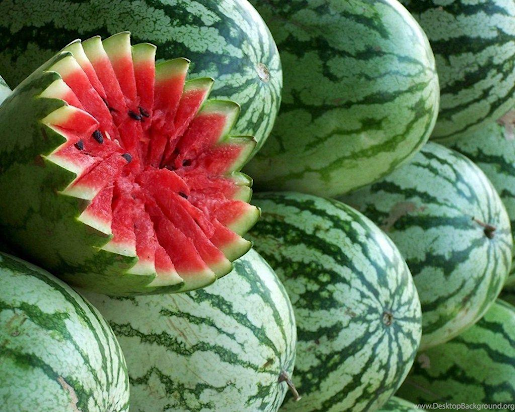Watermelon is a refreshing and sweet fruit that is perfect
for hot summer days! It consists of about 92% water, making it highly
hydrating. The flesh is typically red or pink, and it contains black seeds,
although there are seedless varieties available. The rind is green and can be
tough to eat, but it is sometimes used for pickling.
Watermelons vary in size, ranging from small, personal-sized
fruits to massive ones that can weigh over 30 pounds. They are usually round or
oval shaped. The skin is thick and smooth, typically dark green or striped.
While the rind is not usually consumed, it can be pickled or
used in preserves in some cultures. The flesh of the watermelon is juicy and
sweet, and while it is commonly red or pink, some varieties can be orange,
yellow, or even white.
Watermelon is a good source of vitamins A and C, which are
important for skin health, immune function, and eye health. It also contains
some B vitamins, as well as minerals like potassium and magnesium.
Watermelon Benefits:
- Rich
in antioxidants, particularly lycopene, which provides its red color and
is linked to heart health and cancer prevention.
- High
water content aids in maintaining proper hydration levels, essential for
skin health, energy, and overall well-being.
- Contains
citrulline, an amino acid that may help reduce muscle soreness
post-exercise.
- Offers
protection against cell damage, supports healthy skin, and promotes good
vision.
- Contributes
to reducing blood pressure and improving cardiovascular health.
- Contains
a small amount of fiber, which helps regulate digestion and promotes a
healthy gut.
- Water
content in watermelon helps prevent constipation by facilitating movement
in the digestive system.
- Vitamin
A in watermelon supports skin cell turnover.
- Vitamin
C promotes collagen production, keeping skin firm and youthful.
- Lycopene's
antioxidant properties protect the skin from UV damage and premature
aging.
- Low in
calories, with a cup containing only about 45 calories, making it a
guilt-free snack option.
- Ideal
choice for those managing their weight while enjoying a refreshing treat.
Uses of Watermelon:
- The
most common way to enjoy watermelon is by cutting it into slices or cubes.
- Watermelon
is often served chilled to enhance refreshment.
- Watermelon
juice and smoothies are popular, especially during warm weather.
- It
blends well with other fruits, such as berries, citrus, and mint.
- Watermelon
can be added to fruit salads for a refreshing taste.
- It can
also be included in savory salads, often paired with feta cheese,
cucumber, or mint.
- Watermelon
can be frozen into popsicles or made into sorbet for a cool, sweet treat.
Disadvantage of Watermelon:
- Watermelon
contains natural sugar (fructose) that can raise blood sugar levels if
consumed excessively.
- Individuals
with diabetes should monitor their watermelon intake to manage blood sugar
levels effectively.
- Despite
a low glycemic index, watermelon has a high glycemic load, which can cause
blood sugar spikes when eaten in large quantities.
- Watermelon
contains some fiber, but is not considered a high-fiber fruit.
- Overeating
watermelon may lead to digestive discomfort, bloating, or diarrhea,
particularly for those unaccustomed to high fruit consumption.
- The
fruit’s high water content can result in frequent urination when consumed
in large amounts, which may be inconvenient for some.
- Allergic
reactions to watermelon are possible, especially in individuals sensitive
to specific proteins; symptoms may include itching, hives, swelling, or
difficulty breathing.
- Those
on potassium-affecting medications should be cautious with watermelon
consumption, as it is high in potassium and can lead to hyperkalemia in
rare cases.
- Overconsumption
of watermelon can lead to an overload of sugars and water, resulting in
bloating, discomfort, or indigestion.
- Watermelon
cultivation requires significant water resources, raising environmental
concerns, especially in water-scarce regions.
- Although
low in calories, watermelon has a moderate carbohydrate content that may
interfere with low-carb or ketogenic diet goals.
- Moderation
is key when consuming watermelon to avoid potential health issues and to
align with dietary restrictions.

Comments
Post a Comment